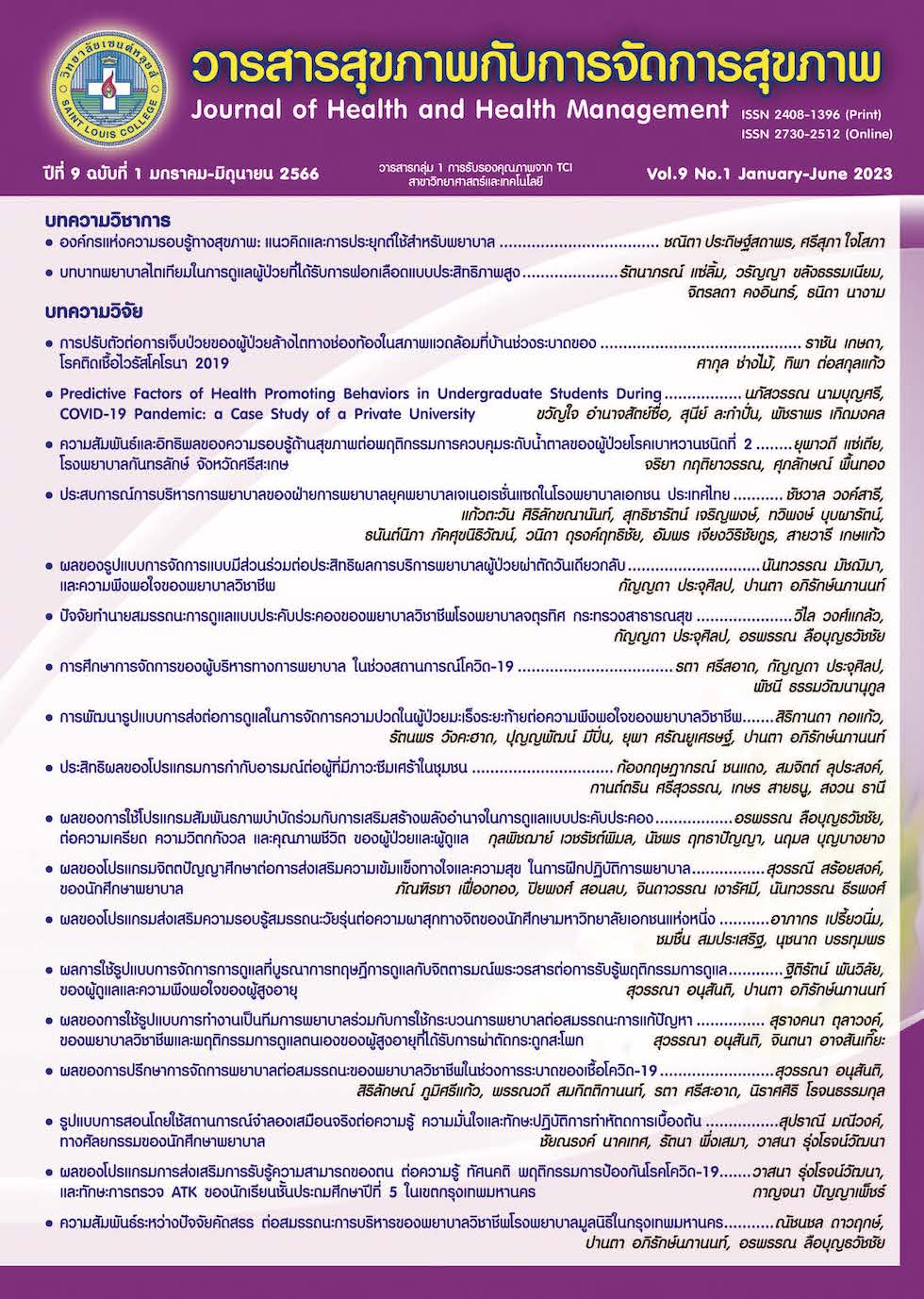The Effects of Contemplative Education Program to Enhance Resilience and Happiness of Nursing Practice Among Nursing Students
Keywords:
Contemplative Education, Resilience, Happiness, Practice, Nursing StudentsAbstract
This quasi-experimental research, a non-randomized control group pretest-posttest design, aimed to study the effects of a contemplative education program to enhance resilience and happiness in nursing practice among nursing students. 74 second-year nursing students studying Principles and Techniques in Nursing Practicum at Boromarajonani College of Nursing, Buddhachinaraj, were recruited to the study. They were divided into experimental and control groups, 37 each. The experimental group participated in contemplative pedagogy, while the control group practiced routine in the clinics. The research intervention was a contemplative education program. The research collecting instruments were resilience and happiness questionnaires. The validity of the questionnaires, related to a contemplative education program, and resilience and happiness, were approved at 1.0, .95, and 1.0, respectively. The reliability of resilience and happiness questionnaires were also approved at .87 and .86, respectively. Data were analyzed using frequency, percentage, mean, standard deviation, independence t-test, and paired t-test. The result revealed that the mean score of resilience and happiness after approaching the contemplative pedagogy of the experimental group was significantly higher than before undergoing the intervention. The scores were higher than that of the control group at levels .01 and .001, respectively. The study's results indicated that contemplative education could enhance resilience and happiness during nursing practice. In addition, it can be used as a guideline for improving the quality of nursing students' practice.
References
กรศศิร์ ชิดดี, และณัฐพร อุทัยธรรม. (2556). กิจกรรมจิตตปัญญาศึกษา กลยุทธ์การพัฒนาบุคลิกภาพนักศึกษาพยาบาล. วารสารมหาวิทยาลัยนราธิวาสราชนครินทร, 5(2), 106-117.
งานกิจการนักศึกษา ฝ่ายวิชาการ วิทยาลัยพยาบาลบรมราชชนนี พุทธชินราช. (2564). ข้อมูลการให้คำปรึกษานักศึกษาพยาบาล. (เอกสารอัดสำเนา). วิทยาลัยพยาบาลบรมราชชนนี พุทธชินราช: พิษณุโลก.
ฐมาพร เชี่ยวชาญ, และอภิฤดี พาผล. (2564). ความเครียดในการขึ้นฝึกปฏิบัติงานของนักศึกษาพยาบาล.วารสารวิชาการมหาวิทยาลัยอิสเทิร์นเอเชีย ฉบับวิทยาศาสตร์และเทคโนโลยี, 15(1), 21-28.
ธนพล บรรดาศักดิ์. (2560). ผลของโปรแกรมการเสริมสร้างความแข็งแกร่งในชีวิตต่อความสุขในการเรียนรู้ของนักศึกษาพยาบาล. (วิทยานิพนธ์หลักสูตรพยาบาลศาสตรมหาบัณฑิต สาขาวิชาการพยาบาลสุขภาพจิตและจิตเวช คณะพยาบาลศาสตร์). ชลบุรี: มหาวิทยาลัยบูรพา.
ธนพล บรรดาศักดิ์, นฤมล จันทรเกษม, อลิษา ทรัพย์สังข์ และวรรณา ชัยชนะรุ่งเรือง. (2564). การป้องกันภาวะซึมเศร้าในนักศึกษาพยาบาล. วารสารวิทยาลัยพยาบาลบรมราชชนนี อุตรดิตถ์,13(1) 62-70.
ธนา นิลชัยโกวิทย์, และอดิศร จันทรสุข. (2559). ศิลปะการจัดกระบวนการเรียนรู้เพื่อการเปลี่ยนแปลง : คู่มือกระบวนการจิตตปัญญา (พิมพ์ครั้งที่ 2). กรุงเทพฯ: วี. พริ้นท์ (1996).
ประวีดา คำแดง. (2564). การสอนในคลินิกตามความคาดหวังของนักศึกษาพยาบาล. วารสารสมาคมพยาบาลแห่งประเทศไทยฯ สาขาภาคเหนือ, 27(1), 17-28.
ปิยพงศ์ สอนลบ, สุวรรณี สร้อยสงค์, ภัณฑิรชา เฟื่องทอง และนันทวรรณ ธีรพงศ์. (2565). ผลของการเรียนโดยใช้จิตตปัญญาศึกษาต่อความสุขในการเรียนรู้และพฤติกรรมการพยาบาลแบบองค์รวมของนักศึกษาพยาบาล.วารสารวิทยาศาสตร์สุขภาพ วิทยาลัยพยาบาลบรมราชชนนี สรรพสิทธิประสงค์, 6(1), 112- 126.
ภวิกา ภักษา. (2563). จิตตปัญญาศึกษา: การจัดกิจกรรมการเรียนรู้สำหรับผู้เรียนในระดับอุดมศึกษา. วารสารศึกษาศาสตร์. มหาวิทยาลัยมหาสารคาม. 14(4), 7-18.
รัตติกรณ์ จงวิศาล , สมสิทธิ์ อัสดรนิธี, ไพรินทร์ โชติสกุลรัตน์ และวิชัย โภคทวี . (2564). สู่ศักยภาพแห่งความเป็นมนุษย์ คู่มือการจัดกระบวนการพัฒนาจิตวิญญาณ พิมพ์ครั้งที่ 3. กรุงเทพฯ: เอเชียดิจิตอล การพิมพ์.
วันเพ็ญ แสงสงวน. (2562). ประสิทธิภาพของโปรแกรมการสร้างความเข้มแข็งทางจิตใจด้วยการใช้ปัญหา เป็นฐานในนักศึกษาพยาบาล. วารสารพยาบาลทหารบก, 20(2), 186-194.
วิมลมาลย์ ศรีรุ่งเรือง, และวันดี คหะวงศ์. (2557). ผลของการพัฒนาคุณธรรมด้วยโปรแกรมจิตวิวัฒน์ในนักศึกษามหาวิทยาลัยสงขลานครินทร์. สงขลา: มหาวิทยาลัยสงขลานครินทร์.
วรวรรณ จันทวีเมือง, และทรงฤทธิ์ ทองมีขวัญ. (2559). นักศึกษาพยาบาลกับการพัฒนาสุขภาพวะทางจิตวิญญาณ. วารสารเครือข่ายวิทยาลัยพยาบาลและการสาธารณสุขภาคใต้, 3(3), 208-219.
องค์อร ประจันเขตต์. (2557). องค์กรแห่งนวัตกรรมการศึกษา ทางเลือกใหม่ของการบริหารการศึกษา. วารสารพยาบาลทหารบก, 15(1), 45-51.
Aryuwat, P., Asp, M., Lövenmark, A., Radabutr, M., & Holmgren, J. (2023). An integrative review of resilience among nursing students in the context of nursing education. Nursing Open, 10(5), 2793-2818.
Contemplative Education Center, Mahidol University. (2014). Contemplative education. Retrieved from http://www.ce.mahidol.ac.th/eng
Grotberg, E. (1995). A guide to promoting resilience in children: strengthening the human spirit. Early childhood development: Practice and reflection number 8. Retrieved from https://bibalex.org/baifa/attachment/documents/115519.pdf
Simmer-Brown, J. (2019). Contemplative teaching and learning: Opportunities for Asian Studies. ASIANetwork Exchange A Journal for Asian Studies in the Liberal Arts, 26(1), 5-25.
Spurr, S., Bally, J., Ogenchuk, M., & Walker, K. (2012). A framework for exploring adolescent wellness. Pediatric nursing, 38(6), 320-326.
Zajonc, A. (2013). Contemplative pedagogy: A quiet revolution in higher education. New Directions for Teaching and Learning, 134(Special issue), 83-94.
Downloads
Published
How to Cite
Issue
Section
License
Copyright (c) 2023 Journal of health and health management

This work is licensed under a Creative Commons Attribution-NonCommercial-NoDerivatives 4.0 International License.




